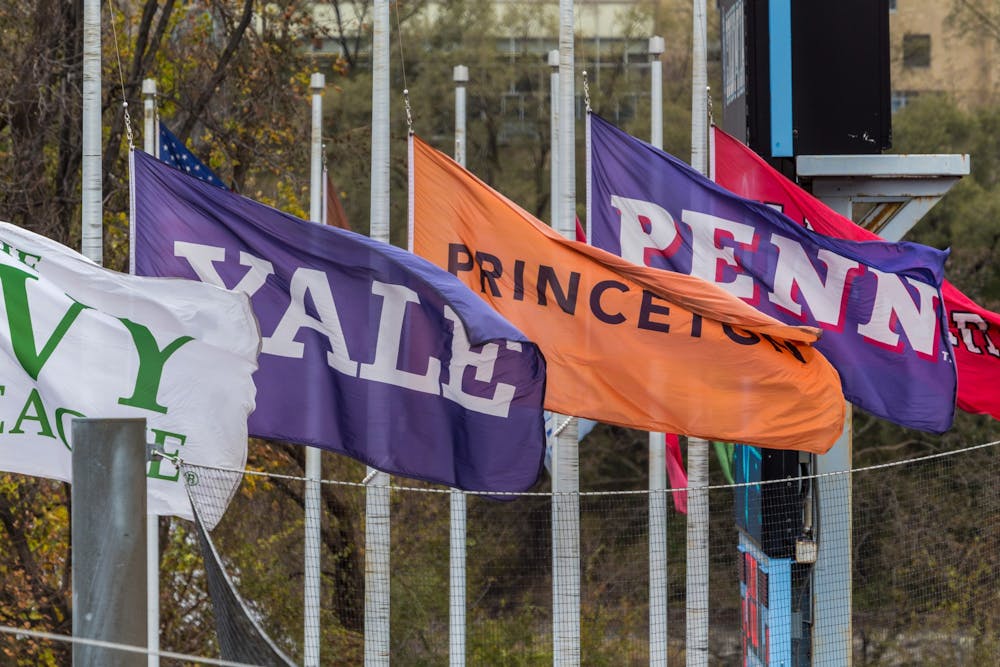
Flags for the Ivy League schools fly at Columbia University's Lawrence A. Wien Stadium in New York on Nov. 17, 2018 (Photo by Kenneth C. Zirkel | CC BY-SA 4.0).
Reflecting on his four years of covering Ivy League football for The Daily Pennsylvanian, former Senior Sports Editor Brandon Pride offers four changes that the conference can make to keep up with the times and empower its athletes.
1. No more co-champions
Going into the last week of Ivy League play, there was a very real possibility that the conference would end in an unprecedented four-way tie. While it didn’t come to fruition (although it came close!), the fact that this was even a possibility is simply laughable. Half of the teams in a conference should not all be “champions." In fact, I would argue that there shouldn’t be more than one champion in a given season, as it cheapens the feat, yet five of the last 10 Ivy League football seasons have ended with co-victors.
There is of course a simple answer to this problem: tiebreakers. Under current rules, if two teams finish with identical conference records, they are automatically co-champions, even if one beat the other head-to-head. Not using tiebreakers is hard to wrap one’s head around, but an even better idea than implementing them is to play a championship game, pitting the two highest-seeded teams against each other after the season. This would be an exciting game that I would expect few, if any, players to have a problem with. At the very least, tiebreakers should be used, as they allow teams to better take their seasons into their own hands.
2. Allow teams to compete in the postseason
Despite the conference often fielding squads that have the athletes to top even the most competent FCS teams, the Ivy League does not allow its football teams to compete in playoffs or bowl games. While the reasons for this have been stated to be because of player safety and the need for the student-athletes to have time to focus on their classes during a stressful part of the academic year, if I was an Ivy League football player, I would find these arguments offensive.
There is no reason that our conference’s student-athletes would be less equipped to balance their academics with one extra game, if anything they would be more well-prepared to do so than the average FCS football player. The same goes for injuries. If players want to opt out for either of these reasons, they should have that option, but the decision to not even give the league’s best players a chance is undoubtedly a questionable one. Currently, a vast majority of Ivy League sports are allowed to play in the postseason, making this one even more of a head-scratcher.
3. Graduate eligibility
These last two suggestions could also apply to the entire Ivy League, not just to football, but they do carry an added poignance on the gridiron.
Although temporary exceptions were made for COVID-19, graduate students are not currently allowed to play for Ivy League teams, even if they have college eligibility remaining. Given that it is very rare for most Ivy League football players to see extended snaps as freshmen, most athletes graduate with at least one year of eligibility to spare. This results in many elite players unnecessarily dragging out their graduation date, or worse, transferring away to other conferences that allow them to play (essentially every other conference except the Ivy) their final years.
A number of Penn football players will have this option next year, from linebacker Jake Heimlicher to wide receiver Rory Starkey to offensive lineman Trevor Radosevisch, some of whom are among many others on the team who have officially announced their intent to enter the transfer portal. The Ivy League should allow these players to stay at their undergraduate institutions if they wish to, where they would serve as veteran presences on their teams and likely receive a higher-quality graduate education than they might elsewhere.
4. Athletic scholarships
The Ivy League’s refusal to offer athletic scholarships poses a number of issues to its schools’ sports. While all of its schools are need-blind, many top-tier athletes from modest financial backgrounds prefer to play at schools where their scholarships are guaranteed upfront and not subject to an often-confusing financial aid process, like they are at the Ivies. Additionally, many players who do not qualify for financial aid — especially those just on the cusp — choose schools that can offer them money over Ivies.
This outdated rule limits the amount of talent that can come into the Ancient Eight, and perhaps explains the limited school spirit at most member schools. It’s not like the colleges can’t afford it either, with Penn for example operating on a $41 million annual athletic budget, in addition to its $20 billion overall endowment.
—
For a conference that is often seen as a bastion of progressivism, the Ivy League has done very little to empower its players. The League hasn’t changed its rules because it knows it doesn’t have to, and the decision-makers in the conference should ask themselves how much they truly care about the players they represent.
BRANDON PRIDE is a Wharton senior studying finance from Morgan Hill, Calif. who was a Senior Sports Editor for the 137th Board of Editors. His email is bpride@wharton.upenn.edu.
The Daily Pennsylvanian is an independent, student-run newspaper. Please consider making a donation to support the coverage that shapes the University. Your generosity ensures a future of strong journalism at Penn.
Donate




